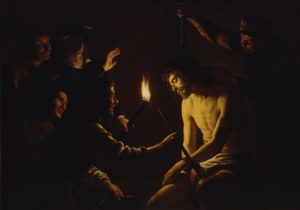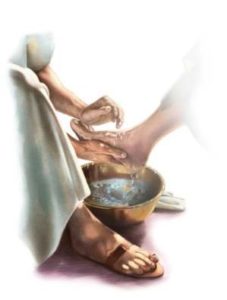TODAY’S READING: THE LAW OF THE KINSMAN REDEEMER, BLESSINGS AND CURSES, JESUS’ TRUE MISSION
OLD TESTAMENT READING- Leviticus 25:47-27:13.
LAW FOR A KINSMAN REDEEMER
The first law we read today is the LAW OF THE KINSMAN REDEEMER (Leviticus 25:47-55). There are a number of provisions in the Law for those who come upon difficult situations that result in poverty. A poor person could be redeemed by a member of the family, a blood relative. This person would be known as a KINSMAN REDEEMER.
Leviticus 25:47-48 (NASB) 47 “Now if the means of a stranger or of a sojourner with you becomes sufficient, and a countryman of yours becomes so poor with regard to him as to sell himself to a stranger who is sojourning with you, or to the descendants of a stranger’s family, 48 then he shall have redemption right after he has been sold. One of his brothers may redeem him.”
This law pertains to the responsibility and right of a kinsman to act on behalf of a suffering relative who has become impoverished or indebted to a stranger. This will become an important provision for those who come upon difficult times in Israel. Unlike the Law of the Jubilee Year, a Law which has prophetic significance, but, according to historians, no record of being implemented, the Laws pertaining to a Kinsman Redeemer are put into practice in the Book of Ruth. This law, and the law of the Levirate marriage (Deuteronomy 25:5-6), will make it possible for the inheritance lost to the household of Elimelech (literally translated, “God is my king”) to be restored through his cousin, Boaz. This provision will also bring a Gentile named Ruth from Moab into the inheritance of Israel, and bring forth a child by Boaz, named Obed, who will be the great great grandfather of King David and the ancestor of Jesus of Nazareth. (More on that exciting story when we get to The Book of “Ruth”!)
This law also anticipates the gospel. Our common ancestors, Adam and his wife, forfeited their inheritance and fellowship with God, selling their birthright to a Stranger, Satan, disguised as a Shining One (Hebrew word for serpent- nahash- derived from ‘enchanter’). To him they have become slaves through sin incurring a debt that is beyond their means to pay. Only a Kinsman, who had sufficient means (no debt of sin or slavery to Satan) could redeem then.
God’s Son would become man, and thereby a kinsman to the human race, yet without sin. He pays the debt in full. The claim is settled on all sides and the oppressed go free!
Hebrews 2:14-15 (NASB) 14 Therefore, since the children share in flesh and blood, He (Jesus) Himself likewise also partook of the same, that through death He might render powerless him who had the power of death, that is, the devil, 15 and might free those who through fear of death were subject to slavery all their lives.
Leviticus 26- Blessings of Obedience (Leviticus 26:1-13)
The list of blessings follows repeated warnings. First, do not make idols for yourselves.
Idols take the place of God and control your lives- your time, your energy, your money, your devotion. Our culture has the habit of bowing down before lawless celebrities and slick marketing campaigns. We can easily trade in our birthright and serve strangers. Hear the words again; You shall not make for yourselves idols.
The second repeated warning is: “You shall keep my sabbaths and reverence My sanctuary”. The Sabbath was an Old covenant sign for Israel.
Ezekiel 20:12 (NASB) 12 “Also I gave them My sabbaths to be a sign between Me and them, that they might know that I am the LORD who sanctifies them.
The New Testament never renews the Sabbath command but introduces Jesus as the Sabbath-giver, the Lord of the Sabbath, — the One who gives a perpetual rest. In the Old Testament the Gentile nations are never commanded to keep the Sabbath, nor are they criticized for not doing so.
The enjoining of Israel to keep the Covenant was a preparation and a means whereby the “keeping of the Covenant” by the Messiah could be recognized. It is also a reminder that by Jesus keeping the covenant on our behalf (perfectly fulfilling the law) we who are identified with Him by faith, receive the benefits of “every spiritual blessing in the heavenly places.”
Ephesians 1:3 (NASB) 3 Blessed be the God and Father of our Lord Jesus Christ, who has blessed us with every spiritual blessing in the heavenly places in Christ,
Romans 8:32 (NASB) 32 He who did not spare His own Son, but delivered Him over for us all, how will He not also with Him freely give us all things?
Let’s look at the earthly blessings promised to an obedient Israel (lit. ‘ruled by God’).
- rains in their season (26:4)
- fruitfulness (26:5)
- More than adequate food supply (26:5)
- Security, safety and peace in the land (26:5-6)
- Against the odds, you will prevail against enemies (26:7-8)
- Enlarged population (26:10)
- God’s attention will be given them, His Tabernacle will be set among them, and He guarantees their acceptance (26:9,11)
- His covenant promise: Leviticus 26:12 ‘I will also walk among you and be your God, and you shall be My people.’

The Lord signs off on these promises with His personal signature (Blessed be His Name!)
Leviticus 26:13 (NASB) ‘I am the LORD your God, who brought you out of the land of Egypt so that you would not be their slaves, and I broke the bars of your yoke and made you walk erect.
PENALTIES TO THE DISOBEDIENT (Leviticus 26:14-39)
Now we examine the penalties given to a disobedient Israel. As we read through the Bible you will see some of these penalties coming to pass in their history.
- The Lord says: I will appoint over you a sudden terror (terrorism) (26:16)
- Consumption and fever, wasting away eyes and causing the soul to pine away. (16:16)
- Wasted crops, goods consumed by enemies (26:16)
- Defeat by enemies, ruled over by those who hate them, creating a paranoia (26:17)
- Sevenfold chastisement (16:18)
- Humiliation (breaking down their ‘pride of power’)
- Famine in the land. A lack of fruitfulness- A Sky like iron and an earth like bronze)

A second set of penalties is promised if they act with hostility towards God and are unwilling to obey Him:
- Increased plagues among them- seven times more according to their sins (26:21)
- Wild Animals, death of children, destroyed livestock and reduced populations. (26:22)
If there is no repentance after the second round of chastisement, He warns of:
- Violent attacks (26:25)
- Pestilence in the cities (26:25a)
- They will be delivered into the enemies’ hands (26:25b)
- Rationing of bread and lingering hunger (26:26)
If, following this, there is no repentance, the result will be:
- Seven-fold increase of chastisement; hunger that leads to cannibalism (26:29)
- Destruction of false worship with their death on the altars of their idols (29:30)
- Destruction of cities and sanctuaries (26:31)
- Desolation of the land (26:32)
- Their dispersal to the nations (26:33)
Verse 34 is an actual prophecy of the Babylonian captivity which would happen centuries later:
Leviticus 26:34-35 (NASB) 34 ‘Then the land will enjoy its sabbaths all the days of the desolation, while you are in your enemies’ land; then the land will rest and enjoy its sabbaths. 35 All the days of its desolation it will observe the rest which it did not observe on your sabbaths, while you were living on it.’
Those who remained behind in the land during the captivity will live in extreme fear, so that they flee when no one is pursuing them. (26:36). They will have no strength to stand up against their enemies (26:37) and they will perish and ‘rot away’ among the nations and their enemies’ lands will consume them.
THE PROMISE TO THE REPENTANT: (26:40-45)
Leviticus 26:40, 41-42 If they confess…. or if their uncircumcised hearts are humbled so that they make amends for their iniquity, I will remember My covenant (to Jacob, Isaac and Abraham) and I will remember the land. The land will make up for its stolen sabbaths.
RULES OF VALUATION OF ONE’S DISCHARGE FROM VOLUNTARY DEDICATION (LEVITICUS 27)
The equal requirement of the shekel of the sanctuary demonstrates that all souls are of equal value before God. (Exodus 38:26)
What is discussed in Leviticus 27 are voluntary vows made in Divine Service. A vow is a promise made voluntarily to God. It is a commitment made to do something that is beyond the requirements of the law in some way. This kind of dedication is not wrong, but it can be made foolishly (as in Jephthah’s case in Judges 11:30-31). Hannah made a vow regarding the son that God would cause her to bear. These vows were made out of gratitude. When vows are made, however, they are to be kept.
Vows are to be taken seriously by God. A vow was to be considered as binding as an oath.
In the cases put forth in Leviticus 27, some vows could be discharged by giving the cash value of what had been dedicated.
In some cases, about which we are not given much information, the special vow (a voluntarily pledge made beyond the requirement of the law) is permitted to be discharged if its enactment is proven to be disrupting to other responsibilities required by law.
For example, Jesus condemned a man who professed to be dedicating his money to the Lord, but did so thinking he should be relieved of his responsibility to care for his parents (Mark 7:11).
In the case of this extraordinary vow being found difficult, and from which a person needed to be redeemed, they are to pay, in redemption silver, the value assessed by the law. The price to discharge a vow varied for the men and women employed in divine service due to the jobs they were able to perform –Men were to pay 50 shekels to discharge a vow during the working years of their lives (from age 20 to 60); females, thirty shekels; Males aged between 5 and 20, (such as the child Samuel, 1 Samuel 1:11 if he were discharged) would be twenty shekels, females 10; Under 5 years old to a month, 5 shekels for the male, three for female. Animals that were dedicated to the Lord could not be exchanged.
The priest will have to value those who are too poor to pay the valuation. Only he could rightly assess their worth in service.
- Campbell Morgan comments:
“Our devotion to the Lord should be complete, because for that He asks. We need add no vow of extra devotion, because we have no extras to offer. Let us ever remember that we cannot ransom ourselves from bondage to Him.”
NEW TESTAMENT READING: MARK 10:32-52
Mark 10:32-34 (NASB) 32 They were on the road going up to Jerusalem, and Jesus was walking on ahead of them; and they were amazed, and those who followed were fearful. And again He took the twelve aside and began to tell them what was going to happen to Him, 33 saying, “Behold, we are going up to Jerusalem, and the Son of Man will be delivered to the chief priests and the scribes; and they will condemn Him to death and will hand Him over to the Gentiles. 34 “They will mock Him and spit on Him, and scourge Him and kill Him, and three days later He will rise again.”
Jesus once again tells His disciples of His impending death. He had told them on two previous occasions that He would be killed and would rise on the third day (Mark 8:31-32; Mark 9:30-31). With each prediction more details are added. First, the disciples learn about His suffering at the hands of the Jewish religious leaders (Mark 8:31), then, they learn He will be betrayed (Mark 9:31) and now, in Mark 10 Jesus reveals that BOTH the Jews AND the Gentiles will have Him killed.
For the first time they learn that He will be killed during His time in Jerusalem. Other details are added: He will be mocked, spat upon, and scourged.
Each prediction Jesus gives of His crucifixion includes the resurrection three days later. And with each prediction Jesus views this not as an unfortunate misunderstanding or an accident. The cross is central to His mission. It is why He came.
Most importantly, Jesus lets His disciples know, and us, that His death would accomplish something:
Mark 10:45b “to give His life a ransom for many.”
JESUS IS NOT OUR ERRAND BOY – BUT THE RANSOMING SERVANT
Mark 10:35 (NASB) 35 James and John, the two sons of Zebedee, came up to Jesus, saying, “Teacher, we want You to do for us whatever we ask of You.”
Don’t we often feel that way. The truth is that God is too good to answer all your prayers the way you want them to be answered.
Jesus does not rebuke their request but digs deeper:
Mark 10:36 (NASB) 36 And He said to them, “What do you want Me to do for you?”
Their request is one that they all agreed upon. They wanted to be with Him, at His side in glory. It’s an understandable request. But notice Jesus’ response:
Mark 10:38 (NASB) 38 But Jesus said to them, “You do not know what you are asking. Are you able to drink the cup that I drink, or to be baptized with the baptism with which I am baptized?”
The disciples had no idea what they were talking about. They replied, “We are able”. Indeed, they would drink the cup of suffering and be baptized into His death in the future, but they were not in the least qualified to bear the sins of the world upon them and atone for sins.
Jesus knows that the Father makes the choices of who will sit on His left and right in the kingdom. Jesus knows that the Father has these matters in hand.
Jesus explains the ambition of those who are to travel with Him and be at His side.
Mark 10:41-45 (NASB) 41 Hearing this, the ten began to feel indignant with James and John. 42 Calling them to Himself, Jesus said to them,
“You know that those who are recognized as rulers of the Gentiles lord it over them; and their great men exercise authority over them. 43 But it is not this way among you, but whoever wishes to become great among you shall be your servant; 44 and whoever wishes to be first among you shall be slave of all. 45 For even the Son of Man did not come to be served, but to serve, and to give His life a ransom for many.”
Let us walk in the authority and privilege given to us as servants.
PSALM 45:1-17
“My heart is overflowing with a beautiful thought!” (v.1)
This tribute to the King is inspired by the Holy Spirit of Prophecy to bring the testimony of Jesus, a greater King, Jesus Christ, the Son of God, the Messiah, who sits on the Throne (Revelation 19:10).
The New Testament confirms this in the Book of Hebrews Chapter 1, verse 8:
Hebrews 1:8 (NASB) 8 But of the Son He says, “YOUR THRONE, O GOD, IS FOREVER AND EVER, AND THE RIGHTEOUS SCEPTER IS THE SCEPTER OF HIS KINGDOM.
Although this psalm may have been written for King David’s wedding day, it is a wonderful Hymn of Praise to the King of Kings!
Verses 10-15 reflects Christ’s love for the church, His bride. The passage echoes the truth that the belovedness of Christ is imputed to the church and He takes delight in His bride.
PROVERBS 10:22
Proverbs 10:22 (NIV) 22 The blessing of the LORD brings wealth, and he adds no trouble to it.
This is a wonderful description of the kind of wealth we experience by the grace of God.
CONTINUE TO PRAY FOR BANGLADESH
Answers to Prayer:
There is encouraging growth among believers both inside and outside conventional church structures. For the last 50 years the churches have been growing faster than the population rate. Churches are increasing, especially in the indigenous denominations.
Pray specifically for:
The people-movement tribal churches. More than 10% of the Santal, Munda, Khasi, Garo, Maraamei, Ralte, Mizo, and Poi people groups are now evangelical.
Another 18 groups have more than 5% of their population as evangelicals. Churches are multiplying. Pray that these churches become strong and full of vision for mission.
Pray that the gospel will be heard among all sections of the population. The majority of indigenous believers are from Hindu backgrounds but there are now tens of thousands from Muslim backgrounds who are reportedly calling on Jesus as Lord.
Pray for the equipping of leaders for the churches of Bangladesh.
PRAYER: Gracious Father, we thank You for the revelation of Your Word. We thank You for Jesus, our Kinsman Redeemer, and His being able and willing to redeem us and restore to us that original inheritance forfeited through sin. We are grateful that Jesus gave His life as a ransom for many. He fulfilled the Law on our behalf and He now offers us rest! May we become more like Christ, the servant of all. Our hearts overflow with thanksgiving when we think of the perfections of our King! Thank you for the fellowship of believers, Your Church, the bride of Christ the King. Fill us with your Spirit that our lives would speak of Your glory! In Jesus’ Name. Amen.
Pastor David
So, naturally, we proclaim Christ! We warn everyone we meet, and we teach everyone we can, all that we know about him, so that, if possible, we may bring every man up to his full maturity in Christ. (Colossians 1:28, J.B. Phillips paraphrase)
New Life Community Church, Concord, MA 10742
www.newlife.org
